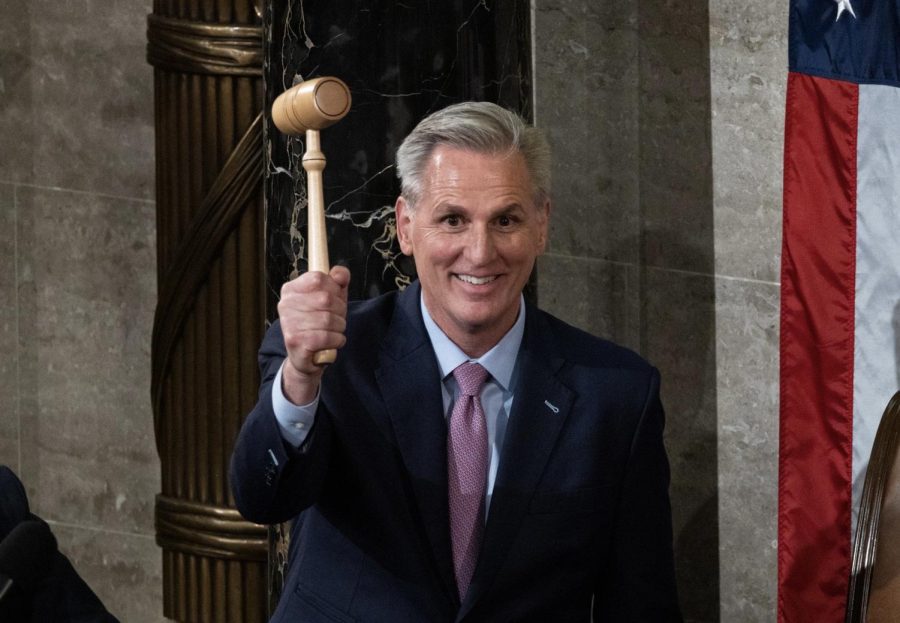Kevin McCarthy: The Wrong Speaker
After 15 votes and concessions to party hard-liners, the California congressman is still unfit to lead the People’s House
Kevin McCarthy holds the Speaker’s gavel after winning election on the 15th ballot.
January 17, 2023
Last spring, I met then-Minority Leader Kevin McCarthy (R-CA) outside the House Chamber. We shook hands, introduced ourselves and shared pleasantries. McCarthy ended the conversation with a bold prediction — my home state of Massachusetts would flip to red in November’s midterm elections.
While the red wave didn’t quite reach the shores of New England, McCarthy managed to steer the ship to a narrow Republican majority. With little room to spare, the speaker vote was bound to be contentious, though few predicted 15 rounds of voting — the longest speaker vote since before the Civil War.
McCarthy’s tactless rise to second-in-line to the presidency strained the holds of our democratic system and is an explicit example of a politician’s personal hubris trumping concern for the nation’s wellbeing. In a Washington free from electoral and personal considerations — a Washington in which the interests of the American citizenry are prioritized — McCarthy would never have been elected Speaker of the House.
The first warning flags for McCarthy’s path to 218 votes were raised following Rep. Andy Biggs’ (R-AZ) announcement that he would be running against the California congressman for the leadership position. Biggs, as former Chair of the House Freedom Caucus, offered a more conservative alternative to the establishment candidacy that McCarthy presented.
Biggs and members of the like-minded “Never Kevin” group cycled through a collection of conservative candidates, starting with Biggs, followed by Rep. Jim Jordan (R-OH), Byron Donalds (R-FL) and Kevin Hern (R-OK), and even included votes for former President Donald Trump. No candidate received more than 20 votes, but it’s clear that the speaker’s gavel was never the goal for the furthest right flank.
Republican losses in the midterms could and should be blamed on the divisive and inflammatory rhetoric spewed by Gaetz, Biggs and other members of their faction. Expectations of huge Republican victories were dampened in the primary season, when mainstream Republicans were beat out by more conservative members of the GOP, who would go on to lose to a Democrat — a pattern seen from Alaska to Michigan to right here in North Carolina. Perhaps the “Never Kevin” group fought so hard for a vote that seemed impossible in a desperate plea to prove that power still exists in their wing.
And how blessed we are that we never had to see a Speaker Jordan or Biggs. These individuals are unafraid of tearing down American values if it means they get a chance to “own the libs.” Under their leadership, C-SPAN would look like a Fox News wasteland, with House speeches, floor debates and committee hearings centered around shallow culture-war issues meant to distract from the fact that they have no real policy agenda.
This is the bottom of the barrel; this is not the first time McCarthy has made a bid for speaker, but it is the first time he has succeeded.
In 2015, unsatisfied with then-speaker John Boehner (R-OH), members of the Freedom Caucus forced Boehner to resign from the speakership and retire from Congress, forcing a new vote for speaker. Then, like now, McCarthy, as majority leader, emerged as the expected heir. But then, like now, conservatives protested McCarthy’s assumption to the gavel.
Almost eight years ago, the Republican Caucus found Rep. Paul Ryan (R-WI) to be the compromise candidate that could bridge the gap between the far right and the center of the Republican Party. McCarthy, aware that he was not a viable candidate, withdrew his nomination and allowed the democratic process to proceed.
In 2023, McCarthy should have followed his own example and charted a path that benefited the nation and not just himself. If McCarthy had allowed his caucus to consider a unifying speaker, perhaps the GOP would be in a better position to govern. Instead, McCarthy’s vote for Speaker of the House exposed a Republican Party incapable of performing the most rudimentary processes of American government without falling apart, fighting in the House chamber and setting back the legislative calendar.
A compromise candidate would have shown the American people that the Republican majority they just elected is capable of performing the duties they were elected to do. But all we’ve seen is McCarthy’s shameless, unyielding devotion to his personal gain, no matter how it reflects on the Republican Party, the People’s House or our nation.
Now we have reached uncharted waters. In this era of paralyzing partisanship, perhaps the solution is working together, rather than trying to tear the other side down. Crazy, I know, but hear me out.
A party-sharing agreement would allow members of any party to come together and form a coalition majority. There are three ways I could envision this happening:
McCarthy could pick off moderate Democrats in exchange for powerful committee assignments. This coalition would be composed primarily of Republicans, with the exception of the “Never Kevin” Group, and aided by an additional minority of Democrats possessing an outside influence on Congress. Nearly a dozen Democratic members would have to be willing to work with a Republican majority for this to work.
Rep. Hakeem Jeffries (D-NY), the chosen minority leader of the Democratic Party, could rope in rogue Republicans. This small group of compromising conservatives would inevitably become the new Trump impeachment crew marooned from their own party and victims of the same fate as the others who dared buck the party line — early retirements, primary losses and public ridicule.
A center coalition could form from moderate members of both parties who would come together to form a functional majority. Representatives focused on governing would then be in charge, allowing the legislative process to continue.
A coalition government seems like fantasy, but it’s the reality in state legislatures across the country. The State Houses of Representatives in Pennsylvania and Ohio and both chambers of the Alaska State Legislature see a power-sharing agreement between Republicans, Democrats and an assortment of Independents. In state legislatures where partisan pressures are minimized, legislators are able to cast party preferences aside and turn their focus to the duties of our government. Perhaps Congress can learn something from the states about how to work together, bridge divides and put aside personal differences for the benefit of our country.
While the nature of national politics would have to drastically change for this compromise scenario to work, it would be a positive turn away from the partisan problems of today. Instead of seeing politicians criticize, villainize and tear down the other side, we would see a push for producing results.
Instead, we’re stuck with Captain McCarthy navigating us through the 118th Congress. But his rise to the top has watered down his power — he’s a speaker in name only. With massive concessions to the disruptive right, our government is now less stable. Over the next two years, we will inevitably see the House slow down to a halt as Republicans distract themselves with petty infighting that will challenge the control of Congress.
If McCarthy had cast aside his personal future and advocated for the good of our nation instead, this political turmoil could have been avoided.














